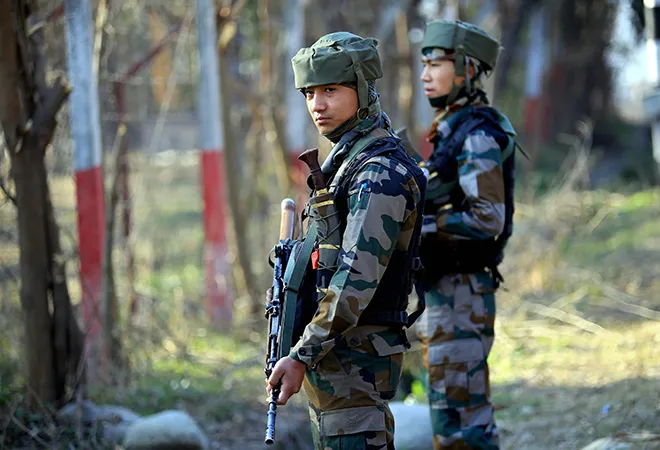On the face of it, there is nothing extraordinary about the agreement reached on May 29 between the Director Generals of Military Operations (DGMO) to “fully implement the ceasefire understanding of 2003 in letter and spirit forthwith and to ensure that henceforth the ceasefire will not be violated by both sides”. Over the last many years, every time the cross-border firing crosses a certain threshold, the hotline between the two DGMOs is handy to step back and lower the temperature.
Sometimes the calm along the LoC lasts days and weeks, sometimes a few months, before the sniping and shelling restarts. The fact that within a few days of the announcement restoring the ceasefire, two BSF jawans were killed in cross-border firing certainly raises questions about the longevity of this latest announcement. While it is entirely possible that an incident or two isn't enough to pronounce a verdict on how durable the ceasefire will be, there is a lot of scepticism about whether this ceasefire is tactical and temporary, or is the harbinger of a major development.
The reason for thinking there’s more to the ceasefire than meets the eye lies in the press releases issued by the two armies. That both sides have used almost identical language while announcing the decision cannot be a mere coincidence.
If anything, it indicates that the agreement on reviving the ceasefire was worked out on the back-channel, and is probably part of an elaborate choreography by the two countries to re-engage each other. What also adds to the suspicion are the statements of the Indian defence and home ministers softening their stand on talks with Pakistan; the “non-initiation of combat operations” in Jammu and Kashmir; the needless euphoria among the usual suspects in Delhi (which weren’t shot down by anyone in the government) over some remarks by the Pakistan army wanting a dialogue with India; resumption of some official level meetings (including an Indian delegation to a SCO meeting in Islamabad and the meeting in Delhi between Pakistan's Maritime Security Agency and the Indian Coast Guard); etc. When you add to this whispers of a meeting between a top Indian official and the most powerful Pakistani official in some third country, the choreography suddenly seems to start making sense.
If indeed it is the case that the first tentative steps towards engaging Pakistan are being taken, then the timing of the move suggests a tectonic shift in India’s policy (or whatever goes for policy) on Pakistan. Until now, India has always maintained that it will speak to whoever is in government in Islamabad. We have never refused to engage with military dictators, nor have we ever really taken a stand that we will only engage with elected civilian governments. Who runs or ruins Pakistan is Pakistan's problem and as far as the government of India was concerned, it would deal with whoever was in charge de jure. While India might have a preference for a democratically elected government which enjoys legitimacy and has the support of the people, it never stopped us from dealing with the man on the horseback. But now we are signalling that we will deal only with the military, regardless of whether it is in Rawalpindi (de facto in control) or has taken over power directly in Islamabad (also de jure in control). In other words, we couldn’t care less who forms the next government in Islamabad, and we care even less about the purported foreign policy of whoever wins the elections.
As far as India is concerned, Pakistan’s India policy is made by the guys in khaki. Rather than waste time dealing with powerless and toothless puppets clad in mufti, we will deal with the guys who call the shots.
This might end up being as desultory a track as the ones we have tread on before with the de jure government, and most likely it will end up that way, but at least we would have been dealing directly with the deal makers and deal breakers rather than with non-entities who would promise something without having the ability to live up to that promise. Worse, there was no point dealing with helpless folk who acted as a foil and shield for the shenanigans of the military.
This is why the timing of the choreography is important. Pakistan is going through a political transition. The elected government’s term was ending two days after the announcement of the ceasefire on LoC. A caretaker government which has no mandate whatsoever to engage in any serious policy matter will run the country for the next two months, until the elections throw up a new government. Normally at a time like this, India (or any other country, for that matter) would wait and see what the elections throw up, let the new government settle, evaluate its policies, assess its credibility, and only then reach out to it. But what India seems to be signalling is that even after an elected (or as is likely, selected) government assumes office in August, the real substantive dialogue—whether on the front or the back channel—will be with the military. With the civilians, there will at best be some sort of cosmetic engagement—a SAARC summit, perhaps?
This might sound good on paper, but what are the chances of it leading to some kind of a breakthrough? Negligible, really. This move is at best a throw of the dice, but the odds of it leading to any kind of paradigm change in Pakistan army’s policy towards India are virtually non-existent. There could be a temporary and tactical change but it won’t be sustainable. Assuming that the current Pakistan army chief is genuinely keen on a peace process—a very heroic assumption, if ever there was one—any deal he signs won’t survive him.
Although as a people, Indians never learn from history or experience, they would do well to remember what happened to the Musharraf-Manmohan engagement: it didn’t survive even a few weeks once Musharraf lost power and office, and neither the civilians nor Musharraf’s successor had any use for whatever understanding had been reached between the two sides. Of course since the understanding couldn’t be repudiated publicly, circumstances were created that it would become collateral damage. Remember the 26/11 attacks?
The bottom line is that the Pakistani deep state doesn’t want peace and normalisation of relations with India. If there are overtures being made from the Pakistani side at this point in time, then it isn't because there has been a change of heart, but because circumstances are compelling the Pakistanis to step back right now.
The fact that even as the Pakistanis make their overtures, the jihad factory and the anti-India propaganda machinery continue to work overtime should be enough wake up even the most somnolent Indian—that there is no change in the Pakistan army policy on India.
Pakistan desperately need breathing space. The CPEC project hinges on a modicum of peace in the region, the Pakistan economy is broke and bankrupt, there is political uncertainty and fears of turmoil, the Americans are breathing down their neck, the financial squeeze might become unbearable if the FATF blacklists Pakistan, and the Afghan situation remains iffy. Under the circumstances, Pakistan cannot afford a hot border with India. More importantly, by lulling India into a dialogue, Pakistan feels it won’t be compromising on Kashmir since it’s already been put on automaton. By the time the peace process unravels, as it inevitably will, Pakistan can re-energise terrorism in Kashmir.
On the Indian side, assuming no one is wearing any blinkers, the calculation would be that ceasefire inside Kashmir and along LoC will create space for some political initiative—though no one seems to have any idea what that initiative will be and with whom—and at the very least cool things down enough to allow the state to get a firmer grip over the situation. That is will be yet another miscalculation and misreading of the situation is another matter.
There are three other factors that should be taken into account by the Modi government before they buy into the lemon of talking to the Pakistan army. First, there are other countries with a direct line to the Pakistan army but it hasn’t done them much good. The Americans have long-standing ties with the Pakistan army but it hasn’t really helped them in getting Pakistan to kick the addiction to jihadist forces like the Taliban and Haqqani network in Afghanistan. What makes India think that it will succeed where the sole superpower not only failed but was also led up the garden path?
Second, it is extremely dangerous for Prime Minister Narendra Modi to go to Pakistan for the SAARC summit. Given the infiltration of Pakistani security forces by jihadists and the jihadist tendencies of the Pakistan army, he could be risking his life by going to Islamabad.
Finally, it is entirely possible that Modi might think that if he can break the logjam with Pakistan and make a peace deal before the 2019 elections, he could go to the electorate with a huge trophy in hand. If this is the thinking, he would do well to consider that the Pakistanis could be using his vanity and proclivity for making a big splash to seduce him, and then stab him in the back. The talk of how only someone like Modi can make peace with Pakistan is a smokescreen.
Think about it. Modi enters into a peace process with the Pakistan army with all the fanfare and just near the elections. The Pakistanis commit treachery to damage Modi beyond repair. The opposition will have a field day, leaving Modi without a leg to stand on. Of course Modi could spin this to his advantage also, quite like Atal Bihari Vajpayee did when suddenly the “Bus, Bomb, Budget” election tagline was replaced by the victory in Kargil slogan. Modi could attempt a spin on the resolute leadership of a man who tried to make peace but was betrayed by a perfidious Pakistan. But it is a risky strategy and worse, a strategy that could prove expensive for the country.
There is also a perceptual problem and a credibility issue that the Modi government will have to address before it enters any engagement process with Pakistan. Even Modi’s diehard supporters talk about how they think aModi is taking an initiative with Pakistan only for political purposes—to present himself as a statesman and also to get through to the 2019 polls without any major incident or embarrassment. The worst thing any government can do is to give an impression that it is politicising matters of national security for personal aggrandizement. The sooner this impression is debunked the better, because Pakistan will be inclined to use this poll calculation as an opportunity to do precisely what Modi might hope they don’t. After fits and starts, the Modi government has started to get its Pakistan policy right. To do a U-turn now would be akin to undoing it all.
This commentary originally appeared in NewsLaundry.
The views expressed above belong to the author(s). ORF research and analyses now available on Telegram! Click here to access our curated content — blogs, longforms and interviews.




 PREV
PREV


